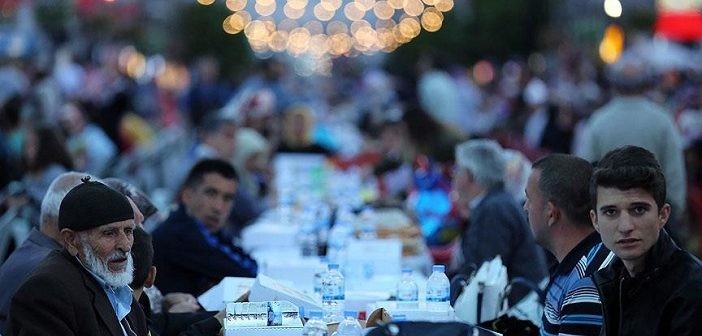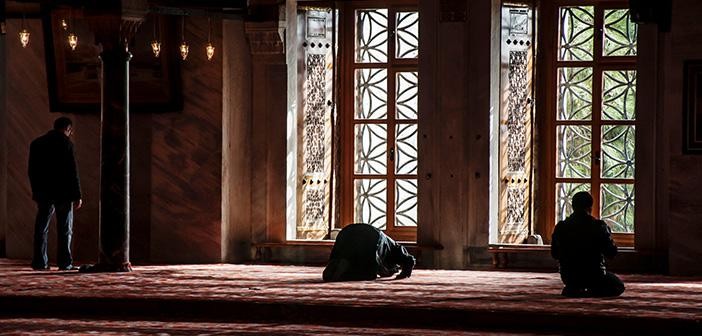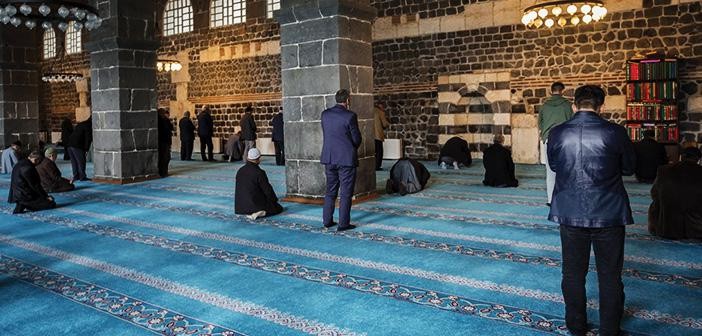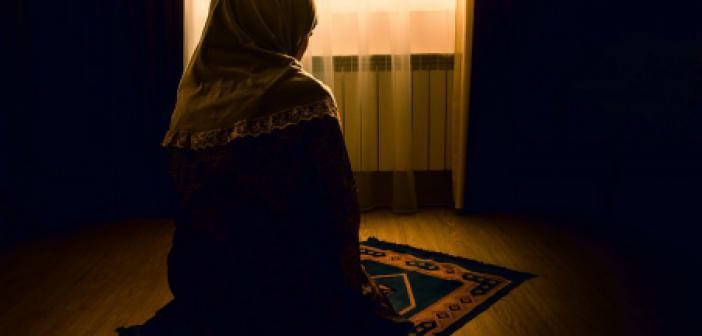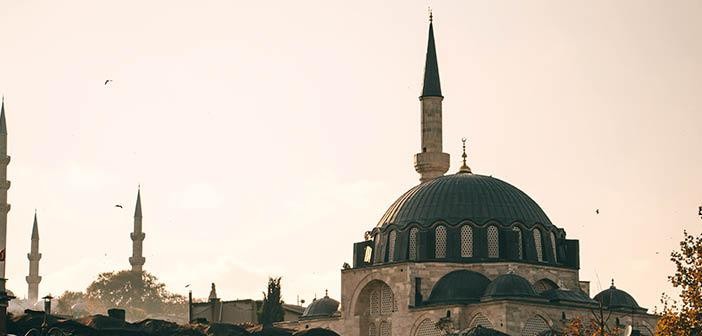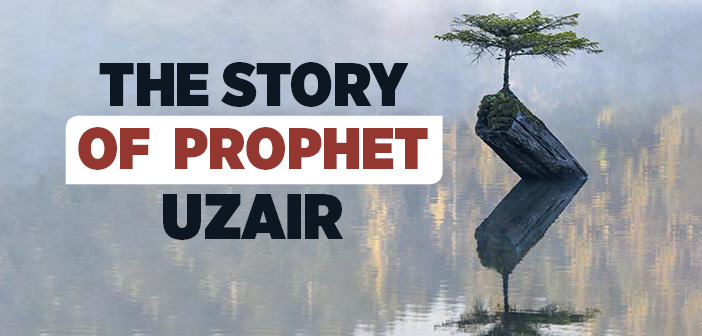
The Story of Prophet Uzair
What is the story of prophet uzair? Who is the prophet uzair? Which prophet slept 100 years and again woke up?
The Man Resurrected After a Hundred-Year Death To Serve as an Example of the Greater Resurrection to Come EZRA -peace be upon him-
Ezra (as) is known, in Islam, as Uzayr. He was a descendent of Aaron (as) and was among a few people, who had memorized the Torah.
The Qur’an does not make it clear whether Ezra (as) was a prophet. The Prophet (saw) has also said:
“I do not know if Ezra was a prophet.” (Ali al-Muttaqi, XII, 81/34087)
The Qur’an only mentions how Allah (jj) took his soul and returned it to him after a hundred years.
In Ezra’s (as) time, the Israelites had become rampant in their violations, for which the Almighty had sent Nebuchadnezzar as punishment. The Babylonian king invaded the regions of Damascus and Jordan, destroyed the Temple, laid waste to towns and farmlands, killed defenseless civilians and took young men and women with him back to Babylon as prisoners. Among them was Ezra (as).
It is narrated that at around the age of fifty, Ezra (as) fled from captivity. He rode a donkey towards Jerusalem. Once the city became visible, he felt saddened upon seeing its buildings and gardens in ruin. He was also hungry; so he tied his donkey to a tree and helped himself to some figs and juice he squeezed from some grapes on the vine. He then sat beneath a tree and gazed, once more, at the devastated land and the remains of human and animal bones scattered around. As he reflected on Allah’s (jj) power and how everything would be raised from the dead, he fell asleep.
The Almighty says:
“Or him who came upon a township as it lay fallen on its roof.
He said, ‘How will Allah revive this after its death?!’
So, Allah made him die for a hundred years. He then resurrected him, and said, ‘How long have you remained?’
He said, ‘I have remained a day or part of a day.’
Allah said, ‘Rather you have remained a hundred years. Look at your food and drink which have not rotted! Then, look at your donkey! We did this to make you a sign for mankind. And look at the bones, how We arrange them and then clothe them with flesh!’
When it all became clear to him, he said, ‘I know that Allah has power over all things.” (Al-Baqarah, 2: 259)
It was the early hours of daybreak, when Ezra (as) had fallen asleep. When he woke back up, the sun had not yet set. But a hundred years had elapsed in between. Nebuchadnezzar was long dead. The captives had returned to Jerusalem, rebuilt the city, as well as the Temple.
Ezra (as) rode into the city on his donkey and saw that everything had changed beyond recognition. The people were not the people he knew, neither were the buildings. He tried searching for his neighborhood. So, he stood by a house to ask an old and crippled woman outside:
“Where is Ezra’s house?”
“This is it!” the old woman said in a sad voice. “But he went missing around a hundred years ago. I used to be his maid.”
“I am Ezra!” he said and went on to explain what happened.
The maid was elated and asked him to pray for her to return to her previous health and condition. Ezra (as) thanked the Lord for the blessings and prayed for the lady. Soon, she regained her former state.
Ezra (as) had an 18-year-old son at the time of his ‘death’. He was now a 118-year-old grey and frail man. He could not recognize his father.
“My dad had a mole on his back shaped like a crescent,” he said.
They lifted Ezra’s (as) shirt and saw that very mole. Nobody had any doubts that the man was indeed Ezra (as).
When Nebuchadnezzar invaded and pillaged Jerusalem, he also had all the copies of the Torah burnt. It was Ezra (as) who revived the religion from its ashes.
According to a report from Ibn Abbas (ra), when the Almighty saw the Israelites turn their backs on the Torah and follow their desire, He took the Ark containing the Torah away from them and made them forget the entire revelation. The Israelites soon felt remorse. Thereupon, Ezra (as) worshipped and prayed to the Lord in lots. Eventually, the Almighty sent down a light that entered Ezra’s (as) heart and allowed him to recollect the Torah. He then retaught it to the Israelites. Later, the Ark was also found; and when the Israelites saw that the Torah they had been taught matched the original copy word for word, their love for Ezra (as) grew.
Yet, despite all this, the Israelites slipped into a deviant path, and went so far as to declare Ezra (as) the son of God.
The Qur’an declares:
“The Jews say, ‘Ezra is the son of Allah,’ and the Christians say, ‘Christ is the son of Allah.’ That is an opinion they mouth, imitating the opinions of the faithless of former times. May Allah assail them, where do they stray?” (Al-Tawbah, 9: 30)
“They have taken their scribes and their monks as lords besides Allah, and also Christ, Mary’s son; though they were commanded to worship only the One God, there is no god except Him. He is far too immaculate to have any partners they ascribe.” (Al-Tawbah, 9: 31)
Even though today’s Jews do not see Ezra (as) as ‘the son of God’, there was a certain Jewish faction at the time that went overboard in their love for Ezra (as) and called him that.
RESURRECTION
Resurrection (bathu bada’l mawt) is to wake up to an eternal life after death. It is the spirit’s journey to eternity. Physically, man first lives among soil, then in the father’s loins, the mother’s womb, the parents’ arms and inside their heart. From the cradle of earth, he is then delivered to the cradle of the grave, to set out on a journey towards the Day of Judgment and from there, to either heaven or hell.
To awaken humans from the slumber of neglect and give them a share of the truth to help them fulfil their duties of servanthood, the Almighty has given miraculous examples to hearts that can hear and see. While these are too many to count, the Almighty has especially dotted both the Qur’an and the cosmos with many striking allusions to our inescapable destiny, resurrection after death.
In the Qur’an, Allah (jj) presents human understanding with the stories of Ezra (as) and the Sleepers of the Cave as cases in point for resurrection.[1] These divine examples contain truths that help hearts mature and take them closer to the Lord.
The Sleepers of the Cave
The Sleepers of the Cave lived in Tarsus, present day Turkey, at the time of the pagan Roman Emperor Decius. They were a group of pious youths, who strived in the way of faith and tawhid.
The Qur’an does not specify their exact number. It simply refers to them as ‘a group of youth’. What the Qur’an lays emphasis on is not their number, names or places of origin but rather the sincerity and quality of their hearts, which has earned them a special mention from the Lord. This is an event laden with lessons and wisdom. It serves as an example of resurrection and aims to give man an insight into many divine truths.
The Sleepers of the Cave were a group of youth from the circle of Emperor Decius. As they were believers in tawhid, they constantly prayed to Allah (jj) in tears to end the pagan emperor’s tyranny. Yet, as the days wore on, the emperor’s pride and conceit heightened his denial and tyranny, to the point he declared himself god. Decius did not stop there, either. He began arresting every person who believed God was one; and after putting them through gruesome torture, had each of them hanged at the gates of the city.
It was around this time that he found out that there were a group of believers from his own circle. He summoned the young men and threatened them. Yet, because the youth had long tasted the eternal zest of faith, they were undaunted. They defended their position before the emperor and told the truth to his face. The Almighty recounts their states of mind in the following:
“We relate to you their account in truth. They were indeed youths who had faith in their Lord, and We had enhanced them in guidance.” (Al-Kahf, 18: 13)
“And We fortified their hearts, when they stood up and said, ‘Our Lord is the Lord of the heavens and the earth! We will never call on any god besides Him, for we will have then have said an atrocious lie!” (Al-Kahf, 18: 14)
“These, our people, have taken gods besides Him. Why do they not at least bring any clear evidence? Who is a greater wrongdoer than he who fabricates a lie against Allah?” (Al-Kahf, 18: 15)
With Decius insisting they return to worshipping idols, the youths said:
“We have one God and recognize no other. We cannot leave the Lord of the heavens and earth for lifeless lumps of stone made by men! There is not even a slight chance we can accept your offer! This is how things will stand until eternity. You are free to do what you can!”
In doing so, they responded to the tyrant Decius with a resoluteness and nobility similar to the Pharaoh’s magicians, who had set out to compete with Moses (as) only to come round to believing in Allah (jj).
Once they were privileged to enter the fold of faith, the magicians responded to the threats of the Pharaoh with the words:
“Your action cannot harm us! One way or another, we will return to our Lord! So, do what you can!”
Decius was furious with the determination he saw in the youths. He stripped off all their official ranks.
“You are still young; do not be foolish!” he then told them. “You have three days to change your mind! Think carefully. Would you rather live or perish?” Following this warning, Decius left them on their own and set out for Nineveh.
This period of grace proved to be a blessing in disguise. The youths had gained valuable time to escape the evils of the emperor. Relying only on the Almighty’s mercy and help and with their dog by their side, the youths left the city and hid inside a cave. Inside, they ate the food they had brought with them and spent day and night worshipping and praying to the Lord with the words:
“Our Lord! Give us a mercy from You and a path of escape out of our situation!”
It is narrated that the Prophet (saw) made the same prayer while inside the Cave of Sawr during the Hegira.
Soon, for the sake of their good deeds, sincerity and genuine prayers, divine mercy came to their aid. Decius had returned from Nineveh and found out about their escape. Immediately, he went out to search and before long, found the cave they were hiding in. For a moment, he thought about a suitable punishment when, through divine providence, the idea of blocking the cave’s entry, crossed his mind. He wasted no time and commanded his soldiers to:
“Block the entrance of the cave! Let them die from hunger and thirst; and let this cave be their grave!”
This way, Decius thought he could bury the youth alive. Yet, little did he know that Allah (jj), who had raised Moses (as) in the Pharaoh’s palace and protected him from the Pharaoh’s evils, was also protecting these youth from his own.
The Almighty, who is the Best of all protectors, encompassed the youth with His eternal mercy and made them sleep inside the cave for 309 years.
Rumi says:
“It is better to sleep than to be with the ignorant and receive their reflection. By separating the Sleepers from the deviant, the Lord preserved their hearts from neglect.”
The Qur’an states:
“You would see the sun, as it rose, slanting toward the right of their cave, and cut across them towards the left when it set, while they remained in a cavern within it. That is one of Allah’s signs. Whomever Allah guides is rightly guided, and whomever He leads astray, you will never find for him any guardian or guide.” (Al-Kahf, 18: 17)
“You would have assumed they were awake, even though they were asleep. We turned them to the right and to the left, and their dog lied stretching its forelegs at the threshold. If you had come upon them, you would have surely turned to flee, and you would have surely been filled with terror!” (Al-Kahf, 18: 18)
When the Sleepers eventually woke up, they supposed they had been inside for a very short time:
“So, We then awoke them and they questioned one another.
One of them said, ‘How long have you stayed here?’
Some of them said, ‘We have stayed a day or part of it.’
Others said, ‘Your Lord knows best how long you have stayed. Send one of you to the city with this money. Let him observe who has the purest food, and bring you back some provisions. Let him be attentive, and not make anyone aware.” (Al-Kahf, 18: 19)
“For if they find out about you, they will either stone you to death, or force you back into their creed. Then you will never be saved.” (Al-Kahf, 18: 20)
One of them went into town to buy food with coins dating back centuries. So, when the shopkeepers noticed this, they informed the emperor, thinking the man had found a treasure.
The new emperor was a pious man. He always gave good advices to those around him and invited them to tawhid, reminding them they will be resurrected after death. Yet, the ignorant among his people were doubtful or in denial of life after death. This would sadden the emperor; and he would pray:
“My Lord! Give me a sign to show these people the reality which they deny!”
At last, when the emperor saw the young man appear, he elatedly announced it to everyone and thanked the Lord for the realization of what he had been waiting for. He then visited the cave and saw the rest of the Sleepers. Divine wisdoms and lessons had thus appeared. Shortly after, the Almighty took the souls of the Sleepers for good.
The Qur’an has praised the Sleepers of the Cave for persevering with their faith, enduring tyranny, remaining steadfast on the path of Allah (jj) and migrating for His cause. Such that they have given their names to the chapter which recounts their experiences (Al-Kahf, means the Cave). Even though the chapter contains other important parables, the fact that it is named after them, indicates the importance of their experience.
Our Prophet (saw) has said that reciting Chapter al-Kahf on a Friday will compensate for all sins until the next Friday. (Suyuti, al-Jamiu’s-Saghir, I, 98) As the chapter sheds light on things we should never fail to remember, such as the struggle of faith, resurrection, the story of Moses and Khidr and how divine power becomes manifest, the Prophet (saw) has advised us to read it at least once a week.
It is also remarkable that the dog that accompanied the Sleepers to the cave, also received a share of their blessing. Interpreters of the Qur’an say that despite being a dog, Qitmir, as it was so called, will also enter paradise for having kept company with the righteous and loyally guarding the cave’s entrance.[2]
Rumi (qs) says:
“For choosing to loyally keep watch over the Sleepers at the gate of the cave, that dog drank from the water of divine mercy, despite having no bowl in front of it. And it earned the right to join them in paradise.”
And Sheikh Sadi (qs) says:
“For hanging around the deviant, Lot’s (as) wife lost her way and became deviant herself. As for the Sleepers’ Qitmir, it acquired the quality of a human for keeping watch over the righteous.”
While revealing the wisdom behind how the Sleepers were put to a 309-year slumber, yet still remained alive despite not eating or drinking, the Almighty also states that this, for Him, is an easy feat:
“Do you suppose that the Companions of the Cave and the inscription are among Our wonderful signs?” (Al-Kahf, 18: 9)
That is because Allah (jj) is the Creator and Executor of far greater affairs. He creates from nothing, takes and gives life.
Through many everyday events, man is given opportunity to grasp the secret of his life and death. On top of that, the Qur’an presents parables, filled with wisdoms that appeal both to the mind and the heart, for humans to also come to terms with their impending resurrection, with reminders of the Almighty’s invincible power:
“Does not man see that We created him from a drop of fluid? And then he becomes an open contender! He draws comparisons for Us, and forgets his own creation. He says, ‘Who shall revive the bones when they have decayed?’ Say, ‘He who produced them the first time, will revive them and He has knowledge of all creation.” (Ya-Sin, 36: 77-79)
“Does man suppose that We will not put together his bones? Yes, indeed, We are able to reassemble even his fingertips!” (Al-Qiyamah, 75: 3-4)
“Is not such a One able to revive the dead?” (Al-Qiyamah, 75: 40)
The Almighty also gives examples from the order of nature to show easy it is for Him to resurrect the dead:
“The faithless claim they will not be resurrected. Say, ‘Yes, by my Lord, you will surely be resurrected, and then you will surely be informed of what you did. That, for Allah, is easy.” (Al-Taghabun, 64: 7)
“Allah made you grow from the earth like grass. He then makes you return to it. And He will bring you forth!” (Nuh, 71: 17-18)
“It is He who sends forth the winds as harbingers of His mercy. When they bear clouds laden with rain, We drive them toward a dead land and send down water. And with it, We bring forth all kinds of crops. Thus will We raise the dead; perhaps you will think.” (Al-Araf, 7: 57)
“So, observe the effects of Allah’s mercy, how He revives the earth after its death! He is surely the reviver of the dead, and has power over all things.” (Al-Rum, 30: 50)
“Do they not see that Allah, who created the heavens and the earth without exhaustion, is able to revive the dead? Yes, indeed He has power over all things.” (Al-Ahqaf, 46: 33)
“Say, ‘Even if you were stones, iron or a creature more fantastic to your minds!’ They will say, ‘Who will bring us back?’ Say, ‘He who brought you forth the first time.’ They will nod their heads at you, and say, ‘When will that be?’ Say, ‘Maybe it is near!’” (Al-Isra, 17: 50-51)
“Do they not see that Allah, who created the heavens and the earth, is able to create the like of them? He has appointed for them a term, in which there is no doubt. Yet, the wrongdoers are only intent on ingratitude.” (Al-Isra, 17: 99)
“All that We say to a thing, when We will it, is to say, ‘Be!’ and it is!” (Al-Nahl, 16: 40)
Also splendidly explained is how we go to sleep each night and wake up the next morning, is really a rehearsal for resurrection:
“It is He who takes your souls by night and knows what you do by day. Then, He reanimates you to complete a set term. Then to Him, you will return, when He will inform you of what you used to do.” (Al-An’am, 6: 60)
As the above verses of the Qur’an explain, the fact that night evolves into day and day into night, how the four seasons follow one another and how, in the meantime, crops die and are reborn, are all reminders of rebirth after death, the awakening to the morning of eternity.
In many passages of the Qur’an, the Almighty demonstrates resurrection to the human mind with clear proofs, which leave no room for doubt:
“O people! If you are in doubt about resurrection, consider that We created you from dust, then from a drop of fluid, then from a clinging mass, then from a fleshy tissue, partly formed and partly unformed, so that We may manifest Our power to you. We establish in the wombs whatever We wish for a specified term. Then, We bring you forth as infants, so that you may come of age. Then, there are some of you who are taken away, and others who are relegated to old age, and knows nothing after having possessed some knowledge. And you see the earth dry and dead, yet when We send down water upon it, it stirs and swells and grows every delightful kind of plant.” (Al-Hajj, 22: 5)
“That is because Allah is the Real; and it is He who revives the dead, and has power over all things.” (Al-Hajj, 22: 6)
“And the Hour is bound to come, there is no doubt in it. And Allah will resurrect those who are in the graves.” (Al-Hajj, 22: 7)
The initial stage of resurrection begins with the first blowing of the trumpet (sur). As a result, every being dies. The trumpet then sounds for the second time, with which all the dead are reborn.
The Almighty describes this as:
“Say, ‘O my people! Act according to your ability. I, too, am acting. Soon you will know!” (Al-Zumar, 39: 68)
Allah (jj) also details how the resurrected will be overcome by a state of shock; and the terrifying scene as people make their way towards the field of gathering (mahshar).
“The day when they emerge from the graves, hastening as if racing toward a target, with a humbled look, overcast by abasement. That is the day they had been promised.” (Al-Ma’arij, 70: 43-44)
“On that day the excuses of the wrongdoers will not benefit them, nor will they be appeased.” (Al-Rum, 30: 57)
“The day the earth is split open for them, they will come out hastening. Mustering them is easy for Us!” (Qaf, 50: 44)
“The day when a man will avoid his brother, mother and father; his spouse and sons. That day each of them will have a worry to keep him occupied. That day some faces will be bright. Laughing and joyous. And some faces on that day will be covered with dust. Overcast with gloom. It is they who are the faithless, the vicious.” (Abasa, 80: 34-42)
“On the day, when faces will turn either white or black. To those with faces black, it will be said, ‘Did you disbelieve after your faith? So taste the punishment because of your disbelief!’ But as for those with faces white, they will dwell in Allah’s mercy, where they will remain forever.” (Al-i Imran, 3: 106-107)
How can a sane person not consider how every particle in the cosmos bursts from a kernel into a festive spring, moving from a micro universe to a macro, from an atom to spheres, and marches forth from life to death in a cycle to be repeated until the final hour, in a harmonious order impossible to fully grasp? Within this impeccable order that leaves the mind in awe, how would Allah (jj) ever create man without a purpose?
The Qur’an declares:
“Did you suppose that We created you aimlessly, and that you will not be brought back to Us?” (Al-Muminun, 23: 115)
“Does man suppose he would be abandoned to futility?” (Al-Qiyamah, 75: 36)
When every particle in the universe, each letter in the Qur’an and every cell in the human being say, in their own language, that nothing is created in vain, it is truly bizarre for man to sleep in neglect, unresponsive to divine wisdoms and truths!
Alas! What sort of a transaction could possibly occur between sleepers? What else can the lives of the ignorant be, other than a blind man’s bluff?
Hearts blinded to the truth have always rejected the lifebuoys held out by prophets and saints, as they clash with their egoistic and animal desires. They instead retreat to the narrow confines of their reason and construct an imaginary world remote from death, and take comfort in empty consolations.
Just as flies enjoy feeding off filth, these people take their misery as bliss; and carry on like the living dead burdened by the weight of their physical existence. That is until they breathe their last and are no more. Many a greedy tyrant, who has never known what it feels like to fall flat on his back, has been knocked out with the mortal blow of death!
For those freed from the amusements of the world and have reached the climes of the heart, death marks birth into the real life. Death is a transition from the world of shadows into the real world.
If fearing and fleeing death was necessary, it would have made sense to shiver with every approaching night! Yet, we never fear. We let ourselves go into the night, knowing that the morning will necessarily dawn as part of the divine order of creation.
Therefore, we must also accept that the morning of truth will dawn from the nightfall of death. The Qur’an eloquently tells us how each passing moment takes us closer to that morning:
“And whomever We give a long life, We cause him to regress in creation. Will they still not reason?” (Ya-Sin, 36: 68)
In the words of a wise intellectual, “For the prudent, the world is a stage to behold divine beauty; while for the ignorant, it is nothing but a plate from which to fulfil desire.”
Our days on earth race ahead with the speed of a car with brake failure. Every day, we witness the autumns of life take someone closer to the end and the storms of death whisk others away. How could we simply watch all this with the cold expression of a sullen statue, hopelessly try to kick open the iron gates of destiny to satisfy fleeting desires, flee the grave we are inescapably bound for or base our lives on a mundane wish for material gain, when we carry the honor and dignity of being human?
As the summary of the book of universe and the manifestation of all divine names, should not man instead look to become energized through spiritual food and live up to the purpose of his creation as best he can? If life is a market, the noblest clothing sold in it is the burial shroud; the very final item on man’s shopping list.
Life on earth passes like a raincloud in summer. How is a life without concern for the hereafter any different to a day, where no thought is spared for the coming night?
The Almighty declares:
“O mankind! Allah’s promise is indeed true. So, do not let the life of the world deceive you, nor let the ‘deceiver’ deceive you concerning Allah.” (Fatir, 35: 5)
Once man throws a thoughtful eye at both himself and the universe, he cannot but rethink how he will lead his life. For those devoted to live by their purpose of creation, there is not greater concern or event than death. That final farewell paints a scene sprawling with lessons. Yet, for those who nourish their flesh but starve their spirit for just a short stay on earth, what a pitiful exhaustion death is!
The moment they are resurrected, they will see the true face of the misery they mistook for joy. The Almighty declares:
“When the sky is rent apart, when the stars are scattered, when the seas are merged, when the graves are overturned, a soul will know what it has sent ahead and left behind.” (Al-Infitar, 82: 1-5)
Once assembled on the field of gathering, people will consider how little time they had spent on earth, compared to the everlasting life that will have just begun:
“The day they see it, it shall be as if they had not stayed in the world except for an evening or forenoon.” (Al-Naziat, 79: 46)
It is for that reason that the Prophet (saw) has these words to illustrate life on earth:
“What business could I have with the world? I am like a wayfarer on horseback who has momentarily taken a break beneath a tree and is about to move on.” (Ibn Majah, Zuhd, 3; Ibn Hanbal, I, 391)
And here is how Allah (jj) describes the mindsets of those with true understanding:
“Those who remember Allah standing, sitting, and lying on their sides, and reflect on the creation of the heavens and the earth, and say, ‘Our Lord, You have not created this in vain! Immaculate are You! Save us from the punishment of the Fire.” (Al-i Imran, 3: 191)
The entire world runs on a sensitive order. Everything is governed by a delicate law of balance. In all the wonders they display, both the skies and the earth are examples of exceptional harmony. The sun and the moon rise and set according to a meticulous formula that also makes the day and night flow one after another. Raindrops fall on the soil according to a measure, while autumn and spring, along with the greenery, sprout in line with a sensitive calculus. Food for every single creature is apportioned with a delicate measure. When the entire cosmos subsists through a divine order and harmony, how is it even thinkable for man, the highest specimen in the universe and the wonder of creation, to lead a reckless life without order, emotion and meaning?
Man has been created to pass the test of life. To do so, he must protect his mental, emotional and physical balance.
Mental balance rests on knowledge of certainty and the light of truth;
Emotional balance, or inner harmony, rests on good morals and a sound heart;
Physical balance relies on valuable deeds that serve the Lord;
…while the inspirational sources of all these are the Qur’an and Sunnah.
In short, as the most honorable of creation, man must uplift himself through faith and good deeds; and live up to the divine order that exists throughout the universe.
In regards to the delicate order within man, the Qur’an and the universe, Allah (jj) tells us:
“The Merciful. He has taught the Qur’an. He created man, and taught him articulate speech. The sun and the moon are calculated. And the herb and the tree prostrate. He raised the sky and set up the balance. Do not infringe the balance! Maintain the weights with justice, and do not shorten the balance!” (Al-Rahman, 55: 1-9)
Our Lord! Include us in this world among your pious servants, who are treasures of wisdom and mysteries; and resurrect us with them on the day of rebirth!
Amin…
[1]. The Qur’an gives another example for life after death in the 260th verse of Al-Baqarah through the incident of the ‘resurrection of the birds’. For more information, see The History of Prophets, V. I.
[2]. See, I. Hakki Bursevi, Ruhu’l-Beyan, V, 226.
Source: The History of Prophets in Light of The Qur’an, THE CHAIN OF PROPHETS, Osman Nuri TOPBAŞ, Erkam Publications
The Creation of Eve





